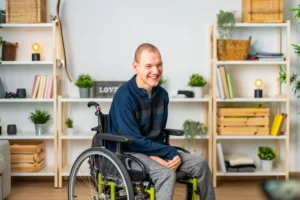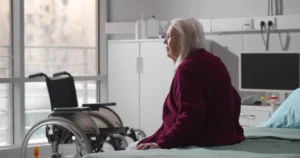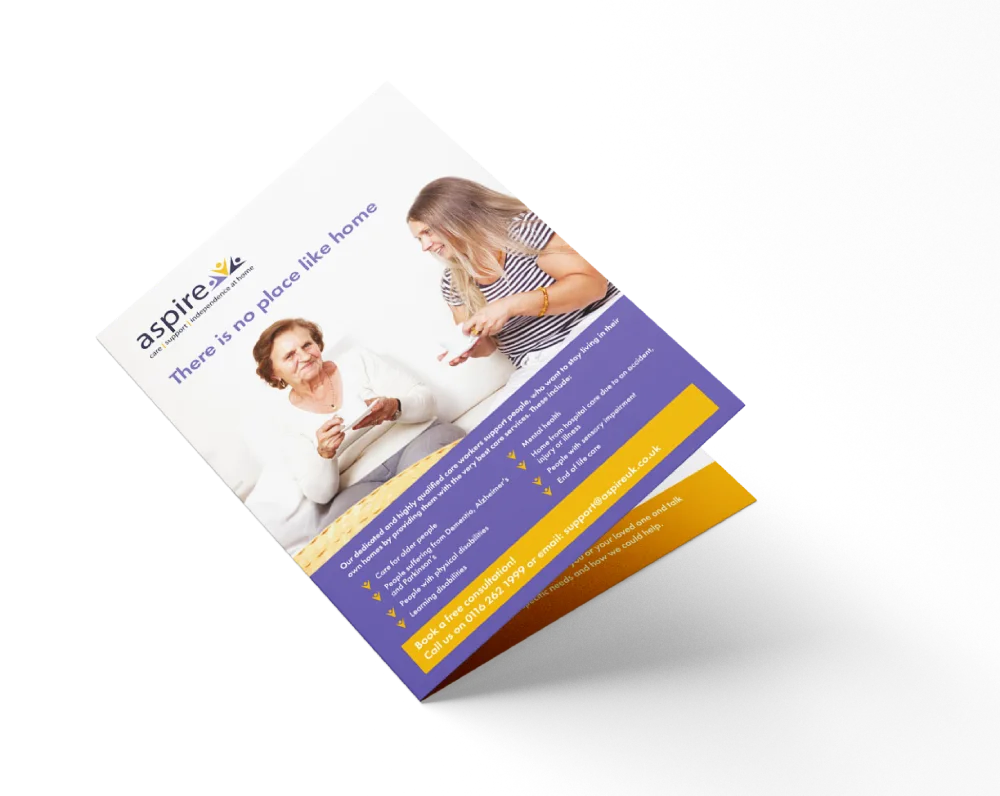At Aspire UK, we know care workers and assistants are an incredibly important part of the home care industry. Our care workers have a positive impact by building meaningful relationships with their clients and helping them lead fulfilled and independent lives.

If you’re reading this article, you may be considering entering the home care industry, or you’re a client or family member who wants to better understand the care you are receiving.
Read on to learn more about home care positions, including general requirements and expectations and what Aspire UK has to offer.

For personalised advice, contact our team at Aspire UK today.
What Are Care Assistants and Care Workers?
In the UK, there are a number of job positions that involve working directly with clients in the home care industry. Terms like care provider, care worker and care assistant are often used interchangeably; in many cases, there are no significant differences between these client-facing roles.
The primary role of care workers is to offer assistance and support to individuals in need of help with everyday tasks such as bathing and dressing, meal preparation, medication management, and social outings.
If there are differences between specific roles, e.g. between a care worker and a care assistant, they tend to relate to the scope of duties. For instance, some care workers are more focused than others on health-related tasks, and work more closely with nurses and other health professionals.
What Qualifications Do Home Care Providers Require?
Most providers in the home care industry won’t require specific education levels or other formal qualifications from employees at the time of applying.
However, many strongly prefer candidates with a QCF Level 2 or 3 qualification in Health and Social Care, also referred to as Care Certificate. If employees don’t have this certificate before starting, they are often able to complete it on the job through in-house training programs.
They may also favour candidates with prior professional experience in the home care industry, or in a similar setting like nursing. But again, it’s usually not compulsory.
So, which skills, attributes or other requirements do employers consider must-haves at the time of applying? These include:
- A basic understanding of – or willingness to learn about – geriatric health, mobility issues and nursing practices
- A wide range of people and interpersonal skills, including relationship and conflict management
- Clear written and verbal communication skills, including the ability to listen to, understand and report on client needs
- An ability to problem-solve and make decisions efficiently
- Organisation skills, including scheduling and multi-tasking
- Compassion, enthusiasm and a great attitude
- Other requirements include references and an enhanced DBS check (to check for a criminal record).
What Training Do Home Care Providers Provide?
Once employed, home care workers typically receive detailed training across a wide range of areas. The exact training they undergo will depend on their employer and the specific role they are filling.
At Aspire UK, we provide extensive in-house training and also assign a mentor to each new person to help them build their confidence.
To help illustrate what may be involved, let’s unpack the three core positions we hire for: care workers; specialist or complex care workers; and Team Leaders.
- Care workers: Our standard care and support workers are trained to help clients with practical domestic tasks, personal care, preparing meals, and medication management. They sometimes offer specialised and complex care, but this is generally not a large part of their role.
- Specialist or complex care workers: These care workers support clients with all aspects of daily living, including practical domestic tasks and personal care as well as respiratory care, therapies and medication administration. The clients they support often have complex health conditions or disabilities including Acquired Brain Injury, Spinal Injuries, Alzheimer’s, Dementia, Motor Neuron Disease (MND) or Multiple Sclerosis (MS). The work tends to be more clinical in nature, and training is delivered by our in-house qualified specialist nurse.
- Team Leaders: Our TL’s ensure the highest standard of care and support is being delivered at all times. They work closely with clients to develop and review tailored care plans; provide guidance to Aspire care workers; and support the company by completing a range of managerial and organisational tasks.

What Do I Need To Work At Aspire UK?
At Aspire UK, qualifications and training are important to ensure that you can provide the highest quality of care to our clients. However, if you accept a standard or specialist/complex care role, we will provide all the necessary qualifications, training and mentoring once you have started.
This means you will receive opportunities to gain your Care Certificate (Level 2 and/or 3) while working and getting paid. You will also receive comprehension training and development throughout your employment, allowing you to develop new skills and enhance your existing knowledge.
Alternatively, if you are applying for a position as a Team Leader, you will be required to already have a Care Certificate (Level 2 or 3).
Have a Positive Impact With Aspire UK
Aspire UK provides numerous benefits to its care workers, including extensive on-the-job training as well as flexible work schedules, competitive compensation rates, job security in a constantly expanding industry, and the chance to have a meaningful impact on people’s lives.
Think you’d make a great addition to the Aspire UK team? Contact us for more information, or get started on your application now.






